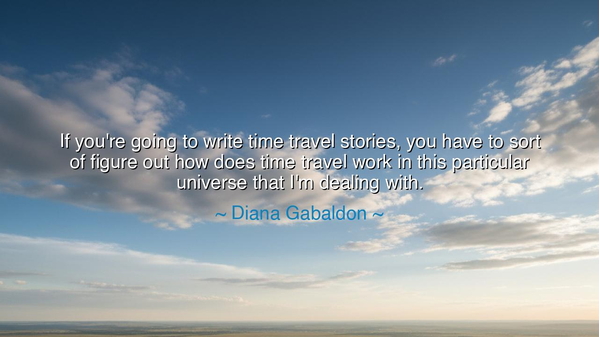
If you're going to write time travel stories, you have to sort
If you're going to write time travel stories, you have to sort of figure out how does time travel work in this particular universe that I'm dealing with.






Hearken, O seeker of wisdom, to the words of Diana Gabaldon, who spoke with the clarity of a scribe of ages: “If you’re going to write time travel stories, you have to sort of figure out how does time travel work in this particular universe that I’m dealing with.” Though she spoke of the craft of storytelling, her wisdom extends far beyond the page. She teaches us that no great creation, no vast vision, no mighty tale can stand unless its foundations are firm. Just as a house must be built upon rock, so must every world—be it of fiction or of life—rest upon order, coherence, and law.
For in truth, Gabaldon does not speak only of time travel, but of the necessity of structure in all acts of imagination and endeavor. To conjure worlds, whether of ink or of stone, is to take upon oneself the labor of the gods. And the gods themselves, in the old stories, did not create the cosmos in chaos but gave it order: night and day, land and sea, the cycles of moon and sun. Without such law, the universe collapses into confusion. So too in our works, be they stories, journeys, or lives—without rules to govern them, they dissolve into emptiness.
The particular universe of which she speaks is the sacred ground of context. Each world, each life, each venture has its own laws, its own rhythms, its own truths. The wise do not impose foreign laws upon a land they do not know, but learn first its essence, then build within it. Thus, Gabaldon counsels writers—and all who create—to discover the hidden rules of their chosen realm. To ignore them is to build castles of mist. To honor them is to forge realms that endure in the minds and hearts of others.
Consider the example of J.R.R. Tolkien, who did not merely write of Middle-earth, but constructed its languages, its genealogies, its laws of history. Because he understood the rules of his universe, his creation breathes with the breath of life even now. Contrast this with stories or ventures that collapse under contradiction, where no thought was given to coherence—such works crumble swiftly, like clay unbaked by fire. Thus Gabaldon’s counsel is not mere advice, but a commandment: know the nature of your world, and let all else be built upon it.
Yet her wisdom is not limited to art. In life itself, we are all storytellers of time, traveling through years and decades, weaving a narrative with our choices. If one does not ask, “How does time travel work in this universe that I’m dealing with?”—that is, how do the laws of this moment, this society, this life, truly operate—then one stumbles in blindness. The traveler who ignores the currents of the river will drown; the one who learns them may sail to glory. So it is with the voyage of existence: wisdom lies in knowing the rules of the universe you inhabit.
And is this not the way of heroes? Alexander of Macedon studied the tactics of war and the customs of lands before conquering them. Leonardo da Vinci observed the hidden laws of nature before sketching his flying machines. Even the mystics of the East knew: before one transcends a law, one must first understand it. For freedom without understanding is folly, and rebellion without knowledge is destruction.
The lesson, then, is clear: know the universe you dwell in, and know the universe you create. Do not rush to build without foundations, nor to journey without a map. Whether you write, work, or live, begin with the sacred labor of understanding. Ask: What are the rules here? What holds this together? What truths must I honor? Once you have answered, then you may dream boldly, shape freely, and even bend the laws—because you have first learned them.
Therefore, in practice: before writing, know your world. Before building, study your materials. Before living fully, observe the patterns of your own time. And then, like Gabaldon, you will find that even the impossible—time travel itself—can become real within the world you have faithfully understood. For order gives birth to wonder, and from the laws of a universe, great beauty is born.






AAdministratorAdministrator
Welcome, honored guests. Please leave a comment, we will respond soon